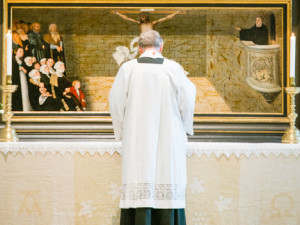by Rev. Matthew Zickler
 I live in the Chicago area. This Fourth of July weekend, we had over 60 shootings. The violence here is depressing. At times it can almost lead one to despair. When experienced firsthand, I am sure it often does. Of course, these shootings aren’t the only ones. There are others. There was the shooting in the club in Orlando, and the shooting before that, and the shooting before that, and the shooting before that. It’s terrible, isn’t it? And that’s just here in the US. There is violence worldwide: in Munich, in Turkey, the bombing in Paris, the beheading of Christians in the Middle East, and, of course, ISIS. It’s enough to make me want to never watch the news.
I live in the Chicago area. This Fourth of July weekend, we had over 60 shootings. The violence here is depressing. At times it can almost lead one to despair. When experienced firsthand, I am sure it often does. Of course, these shootings aren’t the only ones. There are others. There was the shooting in the club in Orlando, and the shooting before that, and the shooting before that, and the shooting before that. It’s terrible, isn’t it? And that’s just here in the US. There is violence worldwide: in Munich, in Turkey, the bombing in Paris, the beheading of Christians in the Middle East, and, of course, ISIS. It’s enough to make me want to never watch the news.
It’s also enough to make me think that the end is near, that perhaps our Lord Jesus will be coming at any moment to call the dead from the grave, and to change those of us still living that we would be able to live before God forever in His Kingdom. Has it ever been this bad?
That is hard to say. We don’t know of all of the shootings that happened in the Wild West, or in the towns in Europe, or the violence that occurred when the Vikings went on their rampages. But what do we know? We know the Church throughout time has always lived as though our Lord could be returning at any moment. Lamenting the sins of the people in his day, Luther himself described the situation saying, “Government can do something to prevent it; otherwise, what Christ says will come to pass, that the last day shall come like a secret snare, when they shall be eating and drinking, marrying and wooing, building and planting, buying and selling. It is so much like what is now going on that I sincerely hope the day of judgment is at hand, although very few people give it any thought.”[1].
Since Luther himself (and the Church throughout time) had the end in view, it would make sense for us to see how the Reformers approached the trials and tribulations—we could say the current events—of their time. What did the event of the Reformation mean for Luther? It meant that there was the imminent threat of peril. Had the Roman Holy Empire been unified and more able to dedicate military forces to the effort, they could easily have rounded up all of the Lutherans and killed them. In addition to the constant tension that the Reformation created, Luther also had to deal with plagues. He had to deal with theological battles within the various Reformation movements. Then, if that weren’t enough, he had to deal with factors outside of the Holy Roman Empire as well. There existed the threat of the Turks on the doorstep of Vienna. Were they to conquer Europe, Christianity would no longer have free course. So how did Luther respond?
 Broadly speaking, Luther approached all suffering in light of what is called the “Theology of the Cross.” He understood that God’s work was hidden in the midst of suffering; that “He deserves to be called a theologian, however, who comprehends the visible and manifest things of God seen through suffering and the cross.”[2] Or as he explains, “[I]t is not sufficient for anyone, and it does him no good to recognize God in his glory and majesty, unless he recognizes him in the humility and shame of the cross.”[3] To relate this to the events of the day, we can see that there are all kinds of suffering happening, but our God is the God who is found in the midst of suffering. In other words, God is so good that He takes the worst thing possible—the death of the perfect man, God in the flesh—and He uses that to accomplish the greatest thing possible: the salvation of sinful mankind. That is to say, God was found in the suffering of Jesus on the cross and through that He accomplished the good of our salvation. What does that tell us about the suffering we see all around us, even in the news today? From the revelation of the cross, we see a God who does not shy away from suffering but actually comes to us in suffering as the God who has suffered. In fact, we see the God who uses the evil in suffering to miraculously work His good will. Seeing the state of the world can be depressing, but we have the comfort of the God who came to us in Jesus and suffered with us and ultimately for us, so that we would know the promise that all suffering will ultimately be overcome on the last day. But even as we experience it now, we know that He works that suffering and all things to the good of those who love Him.
Broadly speaking, Luther approached all suffering in light of what is called the “Theology of the Cross.” He understood that God’s work was hidden in the midst of suffering; that “He deserves to be called a theologian, however, who comprehends the visible and manifest things of God seen through suffering and the cross.”[2] Or as he explains, “[I]t is not sufficient for anyone, and it does him no good to recognize God in his glory and majesty, unless he recognizes him in the humility and shame of the cross.”[3] To relate this to the events of the day, we can see that there are all kinds of suffering happening, but our God is the God who is found in the midst of suffering. In other words, God is so good that He takes the worst thing possible—the death of the perfect man, God in the flesh—and He uses that to accomplish the greatest thing possible: the salvation of sinful mankind. That is to say, God was found in the suffering of Jesus on the cross and through that He accomplished the good of our salvation. What does that tell us about the suffering we see all around us, even in the news today? From the revelation of the cross, we see a God who does not shy away from suffering but actually comes to us in suffering as the God who has suffered. In fact, we see the God who uses the evil in suffering to miraculously work His good will. Seeing the state of the world can be depressing, but we have the comfort of the God who came to us in Jesus and suffered with us and ultimately for us, so that we would know the promise that all suffering will ultimately be overcome on the last day. But even as we experience it now, we know that He works that suffering and all things to the good of those who love Him.
To explain this in another way, we see what this means in the epitomic Reformation hymn, “A Mighty Fortress.” This hymn was inspired by Psalm 46 which says, “Come, behold the works of the Lord, how he has brought desolations on the earth.” God has brought desolations on the earth. If we didn’t know God’s disposition toward us, that would be terrifying. But in the cross we do. We know that God loves us and desires the best for us, that is, the eternal best for us. Only in view of that, can we look at the world, look at the news and say as the Psalm does, “God is our refuge and strength, a very present help in trouble. Therefore we will not fear though the earth gives way, though the mountains be moved into the heart of the sea, though its waters roar and foam, though the mountains tremble at its swelling. There is a river whose streams make glad the city of God, the holy habitation of the Most High. God is in the midst of her; she shall not be moved; God will help her when morning dawns. The nations rage, the kingdoms totter; he utters his voice, the earth melts. The Lord of hosts is with us; the God of Jacob is our fortress.”
 This understanding was true for Luther in his time. It’s true for us in the midst of our time, no matter what the news has to bring. It’s true so that we can sing that wonderful hymn with Luther, “And take they our life, goods, fame, child or wife, though these all be gone, our vict’ry has been won, the Kingdom ours remaineth.”
This understanding was true for Luther in his time. It’s true for us in the midst of our time, no matter what the news has to bring. It’s true so that we can sing that wonderful hymn with Luther, “And take they our life, goods, fame, child or wife, though these all be gone, our vict’ry has been won, the Kingdom ours remaineth.”
The Rev. Matthew Zickler serves as Pastor of Grace Lutheran Church in Western Springs, Ill.
[1] Martin Luther, Luther’s Works, Vol. 44: The Christian in Society I, ed. Jaroslav Jan Pelikan, Hilton C. Oswald, and Helmut T. Lehmann, vol. 44 (Philadelphia: Fortress Press, 1999), 214.
[2] Martin Luther, Luther’s Works, Vol. 31: Career of the Reformer I, ed. Jaroslav Jan Pelikan, Hilton C. Oswald, and Helmut T. Lehmann, vol. 31 (Philadelphia: Fortress Press, 1999), 40.
[3] Martin Luther, Luther’s Works, Vol. 31: Career of the Reformer I, ed. Jaroslav Jan Pelikan, Hilton C. Oswald, and Helmut T. Lehmann, vol. 31 (Philadelphia: Fortress Press, 1999), 52–53.
